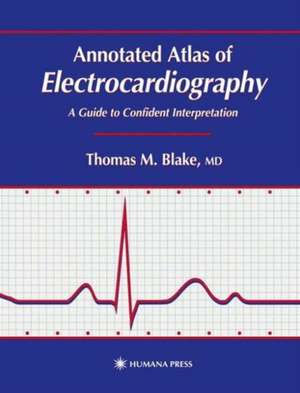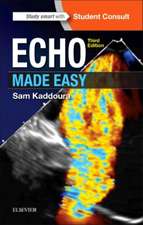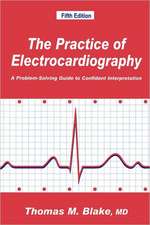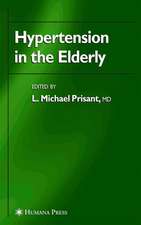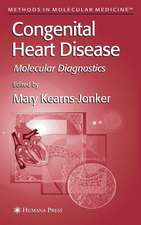Annotated Atlas of Electrocardiography: A Guide to Confident Interpretation: Contemporary Cardiology
Autor Thomas M. Blakeen Limba Engleză Hardback – 23 oct 1998
| Toate formatele și edițiile | Preț | Express |
|---|---|---|
| Paperback (1) | 721.40 lei 6-8 săpt. | |
| Humana Press Inc. – 23 oct 1998 | 721.40 lei 6-8 săpt. | |
| Hardback (1) | 692.75 lei 38-44 zile | |
| Humana Press Inc. – 23 oct 1998 | 692.75 lei 38-44 zile |
Din seria Contemporary Cardiology
- 5%
 Preț: 1055.15 lei
Preț: 1055.15 lei - 5%
 Preț: 1050.55 lei
Preț: 1050.55 lei - 5%
 Preț: 913.76 lei
Preț: 913.76 lei - 5%
 Preț: 856.36 lei
Preț: 856.36 lei - 5%
 Preț: 1050.04 lei
Preț: 1050.04 lei - 5%
 Preț: 1191.72 lei
Preț: 1191.72 lei - 5%
 Preț: 1861.58 lei
Preț: 1861.58 lei - 5%
 Preț: 1425.76 lei
Preț: 1425.76 lei - 5%
 Preț: 1939.99 lei
Preț: 1939.99 lei - 5%
 Preț: 1440.96 lei
Preț: 1440.96 lei - 5%
 Preț: 1845.81 lei
Preț: 1845.81 lei - 5%
 Preț: 1449.76 lei
Preț: 1449.76 lei - 5%
 Preț: 1936.53 lei
Preț: 1936.53 lei - 5%
 Preț: 1117.46 lei
Preț: 1117.46 lei - 5%
 Preț: 1330.79 lei
Preț: 1330.79 lei - 5%
 Preț: 1111.46 lei
Preț: 1111.46 lei - 5%
 Preț: 1412.62 lei
Preț: 1412.62 lei - 5%
 Preț: 1464.18 lei
Preț: 1464.18 lei - 5%
 Preț: 729.98 lei
Preț: 729.98 lei - 5%
 Preț: 1172.69 lei
Preț: 1172.69 lei - 5%
 Preț: 1440.23 lei
Preț: 1440.23 lei - 5%
 Preț: 1111.61 lei
Preț: 1111.61 lei - 5%
 Preț: 1433.83 lei
Preț: 1433.83 lei - 5%
 Preț: 1315.77 lei
Preț: 1315.77 lei - 5%
 Preț: 1305.09 lei
Preț: 1305.09 lei - 5%
 Preț: 1102.31 lei
Preț: 1102.31 lei - 5%
 Preț: 1116.57 lei
Preț: 1116.57 lei - 5%
 Preț: 717.37 lei
Preț: 717.37 lei - 5%
 Preț: 1107.58 lei
Preț: 1107.58 lei - 5%
 Preț: 1103.95 lei
Preț: 1103.95 lei - 5%
 Preț: 1445.50 lei
Preț: 1445.50 lei - 5%
 Preț: 736.39 lei
Preț: 736.39 lei - 5%
 Preț: 1112.17 lei
Preț: 1112.17 lei - 5%
 Preț: 787.02 lei
Preț: 787.02 lei - 5%
 Preț: 1937.46 lei
Preț: 1937.46 lei - 5%
 Preț: 1435.64 lei
Preț: 1435.64 lei - 5%
 Preț: 1109.59 lei
Preț: 1109.59 lei - 5%
 Preț: 1318.45 lei
Preț: 1318.45 lei - 5%
 Preț: 1110.32 lei
Preț: 1110.32 lei - 5%
 Preț: 1610.48 lei
Preț: 1610.48 lei
Preț: 692.75 lei
Preț vechi: 729.20 lei
-5% Nou
Puncte Express: 1039
Preț estimativ în valută:
132.58€ • 137.90$ • 109.45£
132.58€ • 137.90$ • 109.45£
Carte tipărită la comandă
Livrare economică 10-16 aprilie
Preluare comenzi: 021 569.72.76
Specificații
ISBN-13: 9780896037625
ISBN-10: 0896037622
Pagini: 233
Ilustrații: VII, 233 p.
Dimensiuni: 210 x 279 x 20 mm
Greutate: 1.01 kg
Ediția:1999
Editura: Humana Press Inc.
Colecția Humana
Seria Contemporary Cardiology
Locul publicării:Totowa, NJ, United States
ISBN-10: 0896037622
Pagini: 233
Ilustrații: VII, 233 p.
Dimensiuni: 210 x 279 x 20 mm
Greutate: 1.01 kg
Ediția:1999
Editura: Humana Press Inc.
Colecția Humana
Seria Contemporary Cardiology
Locul publicării:Totowa, NJ, United States
Public țintă
Professional/practitionerCuprins
1. Introduction.- Target Audience.- Electrocardiography and Physical Examination.- The Clinical Nature of Electrocardiography.- How to Use This Book.- About the Tracings.- 2. Methods.- Methods.- Summary of Rules, Assumptions, Methods, and Criteria for EKG Interpretation.- 3. A Guide to Use of the Collection.- Consider.- A Tutorial: The Mechanism.- A Tutorial: Examination of One Heartbeat.- The Collection.- 4. The Collection of Electrocardiograms.- Appendix I. Definitions.- The Tracing and its Components.- Technical Features of the Tracing.- Vocabulary.- Appendix II. Abbreviations Used in This Book.
Recenzii
". . . provides a summary of rules by which clinicians can document their EKG findings and compare them with the patient's history and physical examination. He also provides worksheets for analyzing an EKG step-by-step. The worksheets are easily photocopied for practice and he provides short forms for use once the longer version becomes second nature. The Annotated Atlas of Electrocardiography is recommended for medical and academic libraries. It is useful for medical and nursing students, clinicians, pathologists and technicians."-E-Streams Academic Library Book Review
Textul de pe ultima copertă
In An Annotated Atlas of Electrocardiography: A Guide to Confident Interpretation, a master practitioner teaches, with 200 sample electrocardiograms, a simple but powerfully enlightening scientific approach to the art of EKG interpretation. Moving beyond the traditional practice of many books that stress technical skill and pattern recognition, Dr. Blake demonstrates in detail how tracings may be interpreted with consistency and confidence. By examining each tracing much like a patient in a physical examination, the author provides a full description of its findings and a detailed clinical explanation of how to interpret it.
Drawing on a lifetime of teaching and practicing EKG interpretation, Dr Blake demonstrates in An Annotated Atlas of Electrocardiography: A Guide to Confident Interpretation an orderly, confidence-inspiring method for arriving at a clinically useful interpretation. Published in both hardcover and paperback, this book will be used by medical students preparing for their exams, by practicing physicians who want to develop a scientifically-based approach to reading EKGs, and by all those who must record tracings, interpret them, or judge an interpretation written by someone else.
Drawing on a lifetime of teaching and practicing EKG interpretation, Dr Blake demonstrates in An Annotated Atlas of Electrocardiography: A Guide to Confident Interpretation an orderly, confidence-inspiring method for arriving at a clinically useful interpretation. Published in both hardcover and paperback, this book will be used by medical students preparing for their exams, by practicing physicians who want to develop a scientifically-based approach to reading EKGs, and by all those who must record tracings, interpret them, or judge an interpretation written by someone else.
